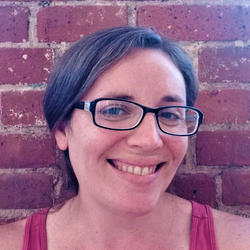Molly Volanth Hall

Molly Volanth Hall (she/her) teaches environmental humanities, British & global Anglophone literature, race and nationalism, and war studies—as well as across these areas. Hailing originally from the Boston area, she earned her PhD from the University of Rhode Island and an MA from the University of New Hampshire, and she also holds an MEd. Molly’s own work dwells most on 20th-century literature in English, with a focus on the modernist period and its aesthetic afterlives.
She is currently at work on a book titled Base Matters: Modernist Environments of War and Empire, which investigates the impact of images of mud, land, soil and stone and ideas on popular imaginings of our ways of belonging to a culture, a country or a physical and environmental place—beginning in the 1910s and radiating out from there. Her research appears in the journal Interdisciplinary Studies in Literature and the Environment (ISLE), The Journal of Literature and Trauma Studies and several edited collections. In 2019, she co-edited a collection of scholarly essays titled Affective Materialities: Reorienting the Body in Modernist Literature (University Press of Florida).
Molly was the recipient of a Frazier Award for Excellence in Teaching at RISD (2023–24). Her classes invite students to explore these and related ideas to learn about other cultures, their own intersections between the two, the multiplicities of either, and the relationship between their artistic practice and its histories, environments and futures.